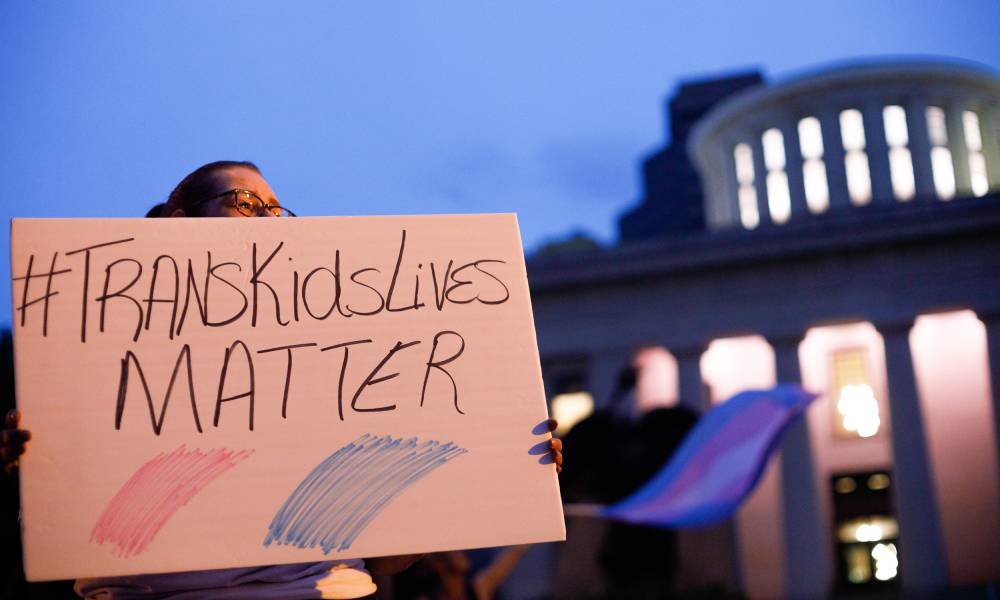Ohio lawmakers advanced a bill that would require student-athletes to undergo a medical “verification” process if their gender is questioned. (Stephen Zenner/SOPA Images/LightRocket via Getty)
Ohio Republicans have advanced a bill that would require student-athletes to undergo a medical “verification” process to enforce a ban trans kids from playing sports.
Lawmakers pushed through the anti-trans bill late Wednesday (1 June) night, the first night of Pride Month. The state House was originally set to vote on a bill to modify Ohio’s teacher residency programme when Republicans added the trans sports ban on it at the last minute, Cleveland-based ABC affiliate WEWS News 5 reported.
The new measure would require schools, state universities and private colleges to establish “single-sex” athletic teams and sports for the “male sex” and “female sex” or have co-ed teams.
The bill would require students whose “sex is disputed” to provide a doctor’s statement verifying their “internal and external reproductive anatomy”. This physician would also need to confirm the student’s “normal endogenously produced levels of testosterone” and perform an “analysis of the participant’s genetic makeup”.
Finally got Sub HB 151, which includes Ohio’s “Save Women’s Sports Act.” This passed close to midnight.
Section C has the verification process if accused of being trans.
– External and internal genitalia evaluation
– Testosterone level check
– Genetic makeup test@WEWS pic.twitter.com/ZhtGOcx4DY— Morgan Trau (News Reporter) (@MorganTrau) June 2, 2022
Under current Ohio law, a trans girl or woman must undergo a minimum of one year of hormone treatment or must demonstrate they do not have any physical or physiological advantages if they want to play girls’ sports in the state.
There is only one trans girl in the entire state that is currently participating in high school athletics, according to Equality Ohio and the Ohio High School Athletic Association (OSHAA).
Democratic state representative Dr Beth Liston added that she was told there has “never been more than one” trans student participating on a high school girls’ team “in any given year” in the “last seven years that the OSHAA transgender policy has been in place”.
“There are not scores of girls’ dreams being crushed, there is one child trying to play on their high school sports team,” Liston said. “This is a made-up controversy and this amendment is state-sanctioned bullying against one child.”
Liston, who is also a physician, then condemned the most “disturbing” part of the bill and lambasted lawmakers for “discussing bills focusing on children’s genitals”.
Equality Ohio said it was appalling that lawmakers were “working to undermine” the state’s LGBTQ+ community on “multiple fronts” on the first day of Pride Month by passing the trans sports ban.
Alana Jochum, Equality Ohio’s executive director, said the “health and safety” of young people in the state are “not negotiable” and shouldn’t be up for debate in the state’s chambers.
“This should not be a partisan issue, and we are appalled that our lawmakers are once again causing real harm to LGBTQ+ youth to score political points,” Jochum said. “All Ohio youth deserve the opportunity to play on a sports team with their peers without having to hide who they are.”

Cathryn Oakley, state legislative director and senior counsel for the Human Rights Campaign, said Ohioans deserve “better than this shortsighted, discriminatory bill that will do real harm” to trans students.
“Transgender students have participated in sports consistent with their gender identity for decades in states around the country, and there’s no actual problem here that needs addressing: this bill is about targeting transgender youth for perceived political gain, not about strengthening women’s sports or helping Ohio’s youth,” Oakley said.
“It’s especially shameful that extremist politicians passed this legislation in the dead of night before leaving town until the fall.”
Oakley called on Republican governor Mike DeWine to “make clear that he will use his veto power” to strike down the trans sports ban if it were to reach his desk.
The anti-trans measure now heads to the Ohio Senate, which won’t meet again until after its recess – which is in November.

Over a dozen states across the US have passed legislation banning trans students from participating in school athletics.
Such bills have been signed into law in Iowa, South Dakota, Oklahoma, Arizona, Kentucky, Utah, South Carolina and Indiana in 2022 alone.
In May, Tennessee extended its already existing anti-trans legislation, which was passed in 2021, to prohibit trans women from participating in women’s “intercollegiate or intramural sports” at the college level.
A trans sports ban was blocked in Kansas after conservative lawmakers couldn’t rally enough votes to overturn governor Laura Kelly’s veto.
LGBTQ+ rights advocates witnessed similar legislation being passed into law last year in Arkansas, Alabama, Florida, Mississippi, Montana, Texas and West Virginia.
